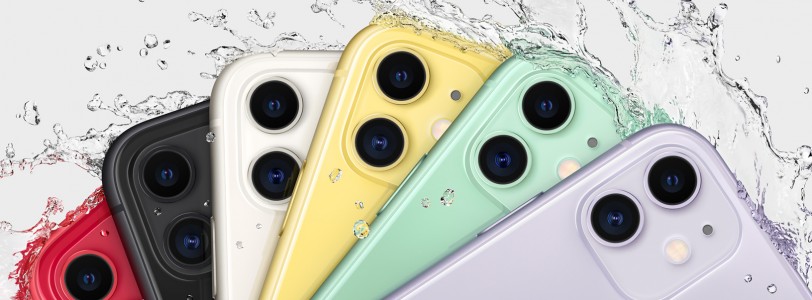In an event to the media last night, which was simultaneously livestreamed on YouTube for the first time, Apple unveiled a host of new hardware products, as well as release dates and pricing for their new gaming and TV subscription services.
Apple Arcade and Apple TV Plus
Apple first announced their new services back in March of this year, unveiling plans for news, gaming and TV subscription services. News+ launched the same month, with Apple Arcade and Apple TV+ both marked for an Autumn release. We now have more details on both.
Apple Arcade, according to them, is the first gaming subscription service that spans mobile, desktop and TV, and will launch with 100 exclusive games. They have partnered with the likes of Konami, Square Enix, and Ubisoft, as well as indie developers such as Annapurna Interactive, Ustwo and Snowman, to build this exclusive catalogue of games. It is launching on 19 September in 150 countries and will cost £4.99 a month, with support for Family Sharing. They will also offer a one-month free trial.
Apple TV+ is perhaps the more interesting of the two, not just because of how competitive the streaming market is, but also because of the money Apple are reportedly spending on it. Launching on 1 November in over 100 countries, Apple TV+ is going to cost just £4.99 a month, which is cheaper than Netflix and, perhaps crucially, cheaper than Disney+. But, although Apple have reportedly set a budget of $6bn for producing content, and are working with talent such as Jason Momoa, Steven Spielberg, Oprah WInfrey, Jennifer Anniston and Rees Witherspoon, it will still launch with a significantly smaller list of shows than Netflix offers, and won’t have a back catalogue of classics that Disney can lean on. However, Apple are going to offer a complimentary year of Apple TV+ with any new iPhone, iPad, or Apple TV.
New iPad
Apple have replaced the 9.7inch entry level iPad with a new 10.2inch model, for the same £349 price (and cheaper for those in education). It has the A10 Fusion processor, which is slightly less powerful than the 10X found in the iPad Pro, but can still edit 4K footage. It also supports the first generation Apple Pencil, and now comes with the Smart Connector, meaning you can attach the full-sized Smart Keyboard to it should you want. It still has a headphone jack and the TouchID sensor, and, slightly disappointingly, still uses the Lightning adaptor. It will also come with the new iPad OS, a fork of Apple’s iOS, with new features to make the most of the larger screen size.
Apple Watch Series 5
The latest version of the Apple Watch is very similar in design to the previous series, but now comes with an always-on display and a built-in compass. It also supports international emergency calling. Additionally, Apple announced two new finishes for Apple Watch - recycled aluminium and titanium - to accompany the previous ceramic and stainless steel, as well as new Nike and Hermès designs. Apple Watch Series 5 starts at £399 for the GPS model, and £499 for the cellular version. They also dropped the price of the Series 3 to £199, and dropped Series 4 from the lineup altogether.
iPhone 11
A year ago Apple announced the iPhone XR, the new entry iPhone with a cheaper price than the iPhone XS that accompanied it. It became the most popular iPhone, in part because of the cheaper price and the array of colours it came in. The iPhone 11 is the successor to that phone.
Like last year, it has a 6.1-inch LCD display, with the same notch for FaceID (which has been updated to be faster) and comes in an array of colours; white, yellow, black, purple, green and red.
The processor has been upgraded to the A13 Bionic, which is touted as the fastest CPU and GPU in a smartphone. In addition to more power, the processor also offers an extra hour of battery life over the XR.
The camera system is the real upgrade though. While the XR had a single 12MP wide-angle camera, the iPhone 11 has a dual-lens system that adds a 12MP ultra-wide lens that supports 2x optical zoom. The camera interface has been reworked to give you an immersive view outside of your current frame so you can see the view from the ultra-wide. Portrait mode has been improved, with a new high-key mono effect, and support for pets. The camera now has an automatic Night Mode that uses adaptive bracketing to take better lowlight shots.
The front facing camera has also been bumped up to a 12MP wide-angle camera that when rotated lets you take wider landscape shots. It supports 4K/60fps video shooting, and slow-mo, which Apple is trying to brand ‘slofies’. Please don’t let that become a thing.
The iPhone 11 will start at £729. Pre-orders start on 13 September, and shipping will start on 20 September.
iPhone 11 Pro and 11 Pro Max
If the iPhone 11 is the phone for the masses, then the iPhone 11 Pro and Pro Max should, as Apple said during the event, be considered the devices for customers who want the ‘most sophisticated technology’.
The iPhone 11 Pro and iPhone 11 Pro Max come with 5.8-inch and 6.5-inch displays respectively. The screen is a new OLED panel to last years, which offers a 2 million to 1 contrast ratio, is 15% more energy efficient, and delivers up to 1,200 nits of brightness. They are now branding the display the Pro Display XDR, in keeping with the branding used for their new $5,000 Pro Display XDR monitor (no word on UK pricing yet). The glass on the front and back is apparently the toughest glass in a smartphone.
Using the same A13 chip as the iPhone 11, Apple claim that the smaller iPhone 11 pro should get four hours more battery life than last years XS, while the larger 6.5 inch Pro Max should get up to five hours more than the XS Max.
The focus once again was on the cameras though, with both Pros touting a triple camera array. This consists of a new 12MP ulta-wide lens with a 120-degree field of view, an ungraded telephoto camera with a larger ƒ/2.0 aperture and the 12MP wide-angle camera. On the front, the camera mirrors the iPhone 11 with a 12MP sensor that supports 4K and slow-motion.
Video has always been a strong element of iPhones, and with the Pros that looks to take another leap forward. Onstage they showed off a new version of Filmic Pro, which lets you shoot video from two cameras simultaneously.
Apple were also generous enough to include an 18W fast charger in the box (although the iPhone 11 still has the atrocious 5W charger) and it also comes with a USB-C to Lightning cable.
The iPhone 11 Pro starts at £1,049 and the iPhone 11 Pro Max starts at £1,149. Preorders start 13 September, and shipping starts on 20 September.









0 Comments